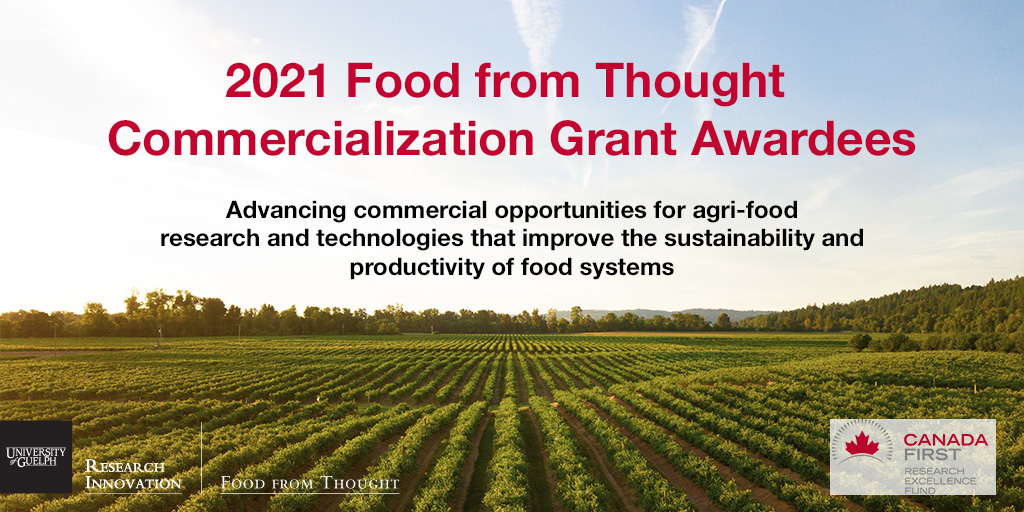Healthier animals, people and environment are the goals of three University of Guelph projects receiving $150,000 in total from the University’s Food from Thought program.
Under one-year commercialization grants announced today, each project will receive $50,000 intended to help bring novel research and technologies to market.
U of G recipients are as follows:
- Bonnie Mallard, Department of Pathobiology: improving livestock herd health and, ultimately, human health
- Gopi Paliyath, Department of Plant Agriculture: nutrient-efficient animal food products
- Michael Rogers, Department of Food Science: using waste proteins as renewable, biodegradable substitutes for plastics.
The Food from Thought program is intended to increase the sustainability and productivity of global food production through use of leading-edge data, agri-food research and biodiversity science.
“A strong entrepreneurial spirit and a commitment to doing research that is relevant drives research excellence at the University of Guelph,” said Malcolm Campbell, vice-president (research).
“We are using Food from Thought programs to support researchers in developing viable and useful products and services that will address real world agri-food challenges. We’re already starting to see the impact these projects will have on improving sustainable food production and enhancing food safety and livestock health.”
Annual commercialization grant awards have been provided since 2018 through U of G’s Research Innovation Office.
Projects are reviewed for criteria including product-market fit, strength of the project team and benefit to Canadians. Members of review panels are government and industry experts in research commercialization and mentoring of start-up companies.
To learn more about the Food from Thought commercialization grant, visit the Research Innovation Office
Meet our 2021 Awardees
Project Name: Maintaining Immunity+ Colostrum Bioactivity using a Unique Cold Plasma Method
Principal Investigator: Bonnie Mallard, Department of Pathobiology
Project Description: The goal of this project is to produce a product that will boost the immune system of cattle. The project team will accomplish this by manufacturing shelf-stable designer colostrum from HIR™/Immunity+ cows using high voltage cold plasma (HVCP) technology, which is used to extend the colostrum shelf-life without compromising its bioactivity.
The HIR™ technology is a patented test method to identify cattle with the most robust and balanced immunity. This technology is also trademarked under Immunity+ by The Semex Alliance, Canada’s largest dairy genetics company. Animals identified under HIR™/Immunity+ animals have substantially lower disease risk and superior quality colostrum with greater amounts of antibody than herd-mates. Colostrum coming from HIR™/Immunity+ cows is in urgent demand because it supports calf health.
Project Name: Nutrient Efficient Animal Food Products
Principal Investigator: Gopi Paliyath, Department of Plant Agriculture
Description: This project builds on previous work showing highly efficient phytonutrients delivery via a food powder (SlimLiivTM). The powder is built from nanomaterials derived from sour cherry grown in Ontario. The powder is shown to reduce inflammation, cholesterol, triglycerides and weight in obese mice. Additional powders will be developed through this project to deliver critical nutrients for livestock with reduced environmental impacts. The goal is to produce nutrient inputs into animal feeds that minimize the amounts required by increasing absorption efficiency. Initial studies suggest that Nanopect™ increases absorption by five to eight times more than other nutrients. This means that at least five times less material would end up in waste from the animals. A similar reduction in environmental pollution and greenhouse gas emissions can be expected.
Project Name: Valorization of waste proteins to a bio-renewable and bio-degradable plastic substitute
Principal Investigator: Michael Rogers, Department of Food Science
Description: Dr. Rogers’ lab recently mimicked petroleum-derived, high molecular weight polymers, such as polypropylene, using various low-molecular-weight bio-renewable and bio-degradable cyclized di-dipeptides acids. This project will use this fundamental science to create a material prototype of industrial relevance to replace single-use plastics.


